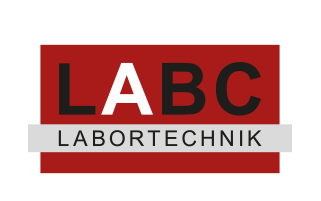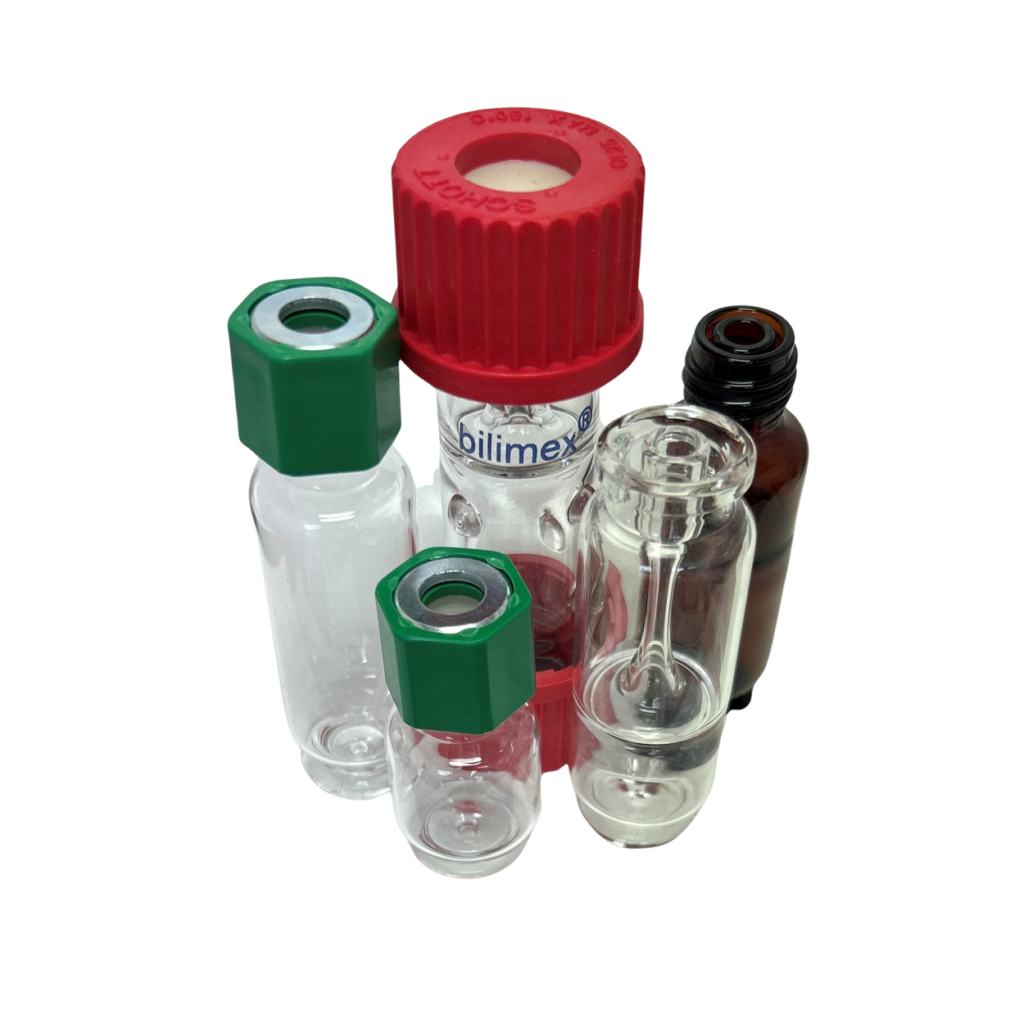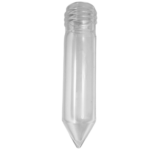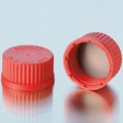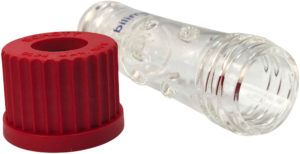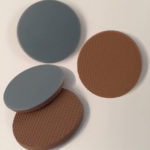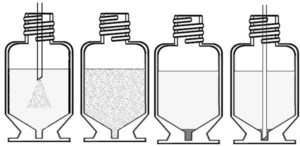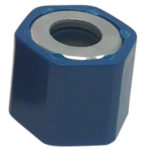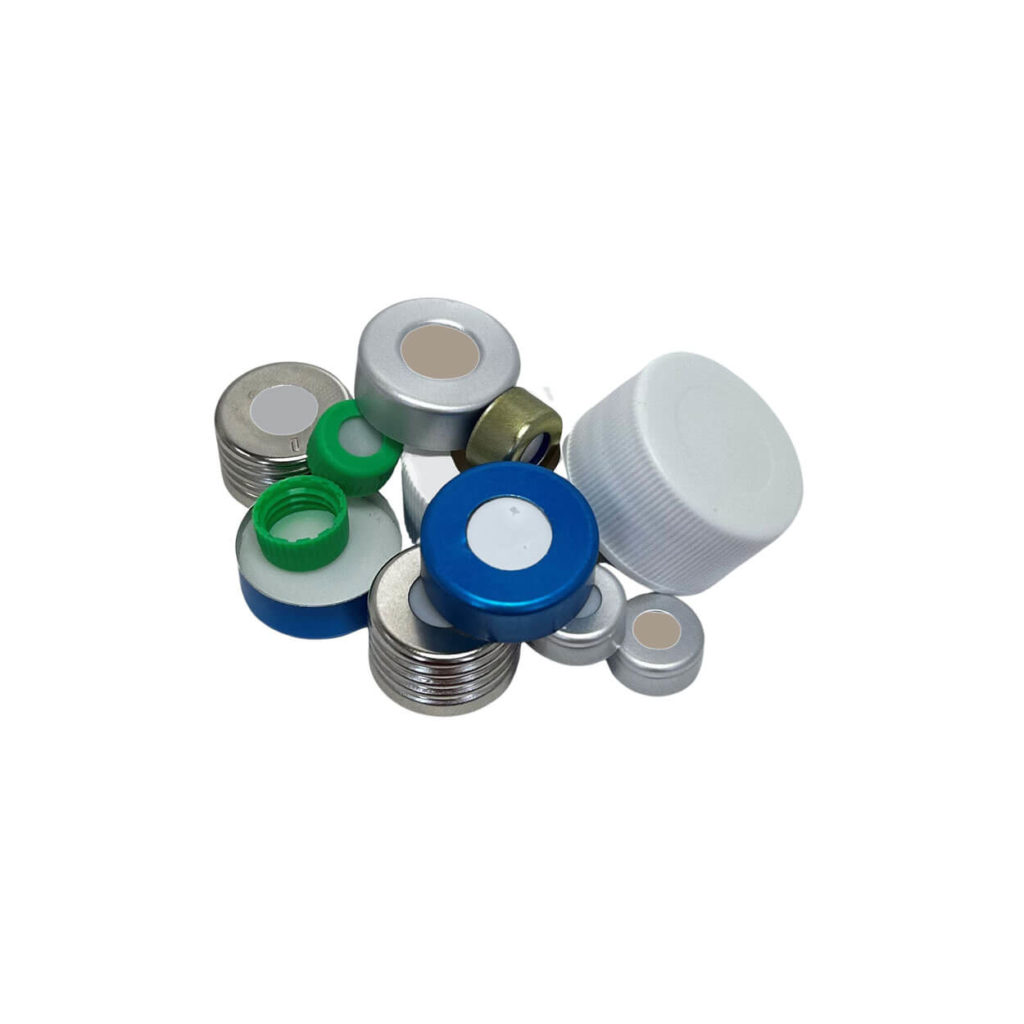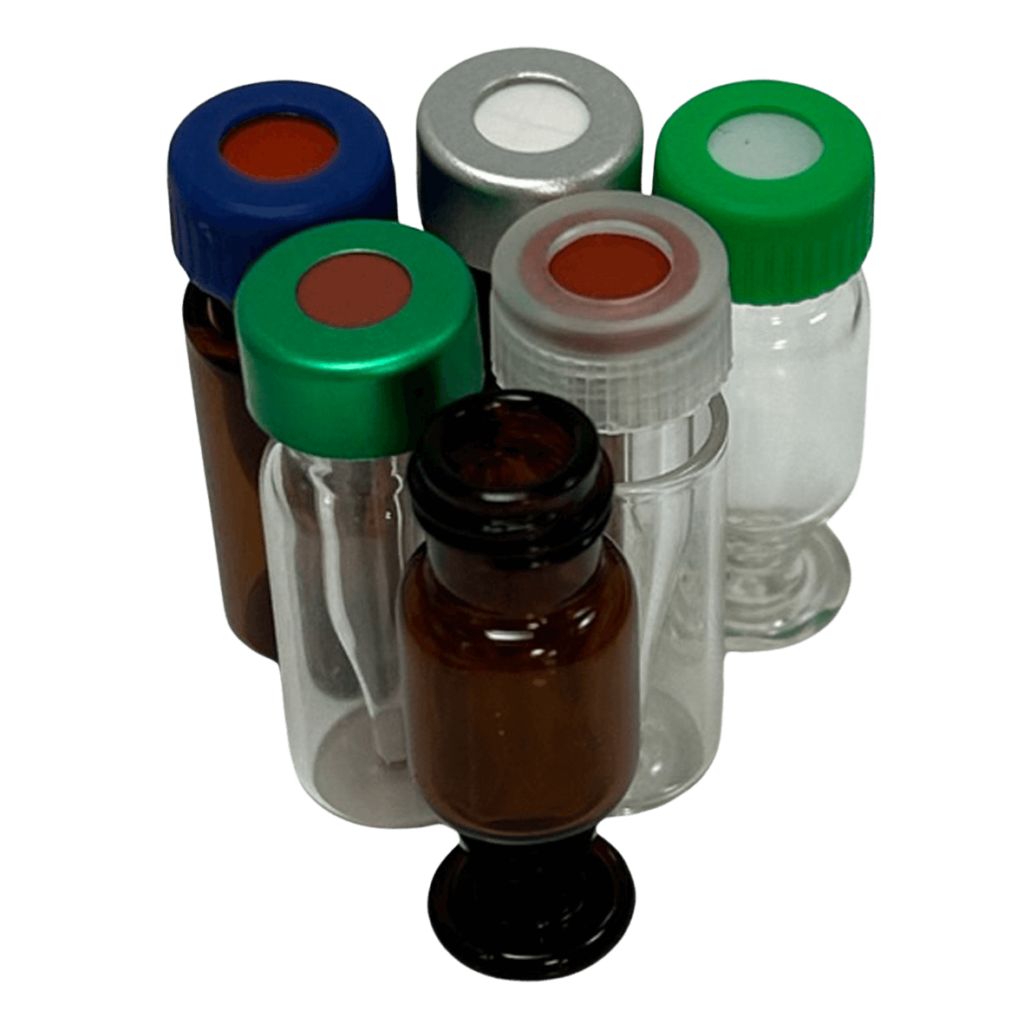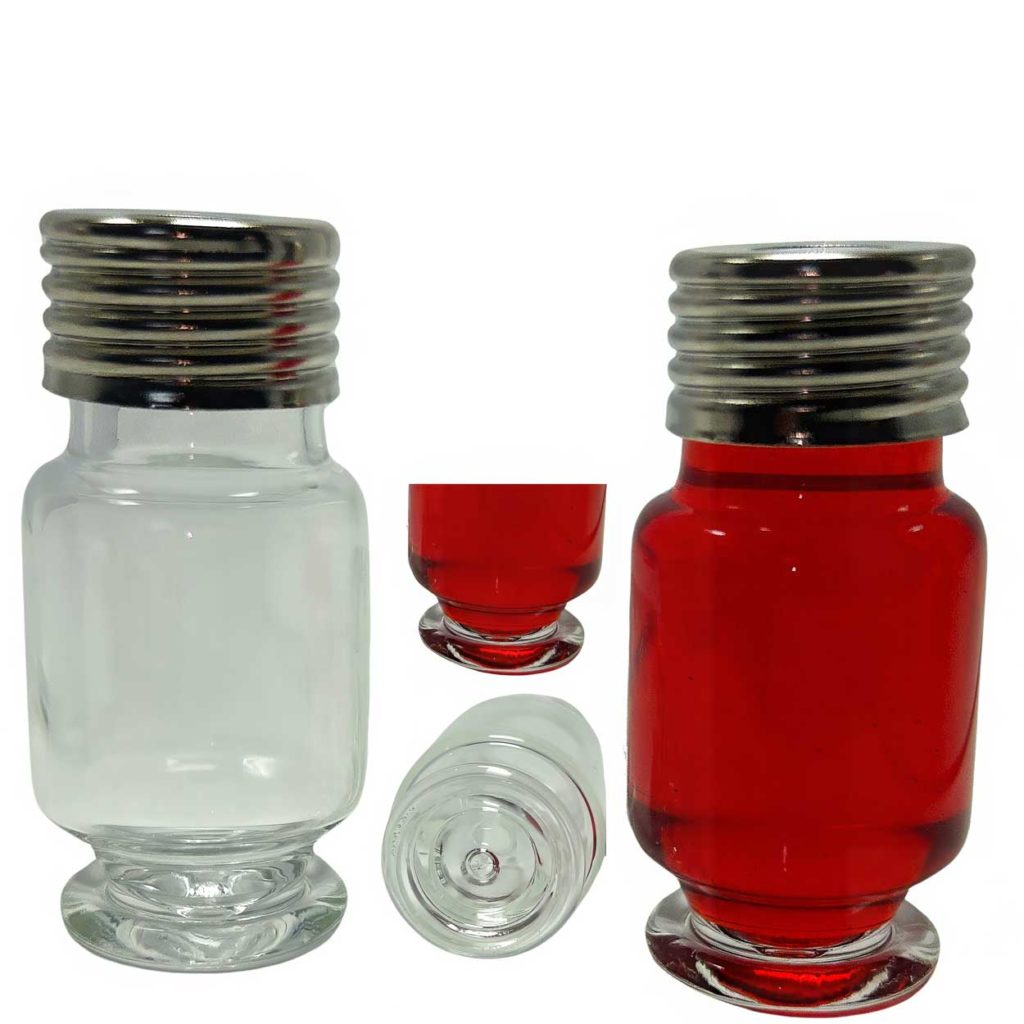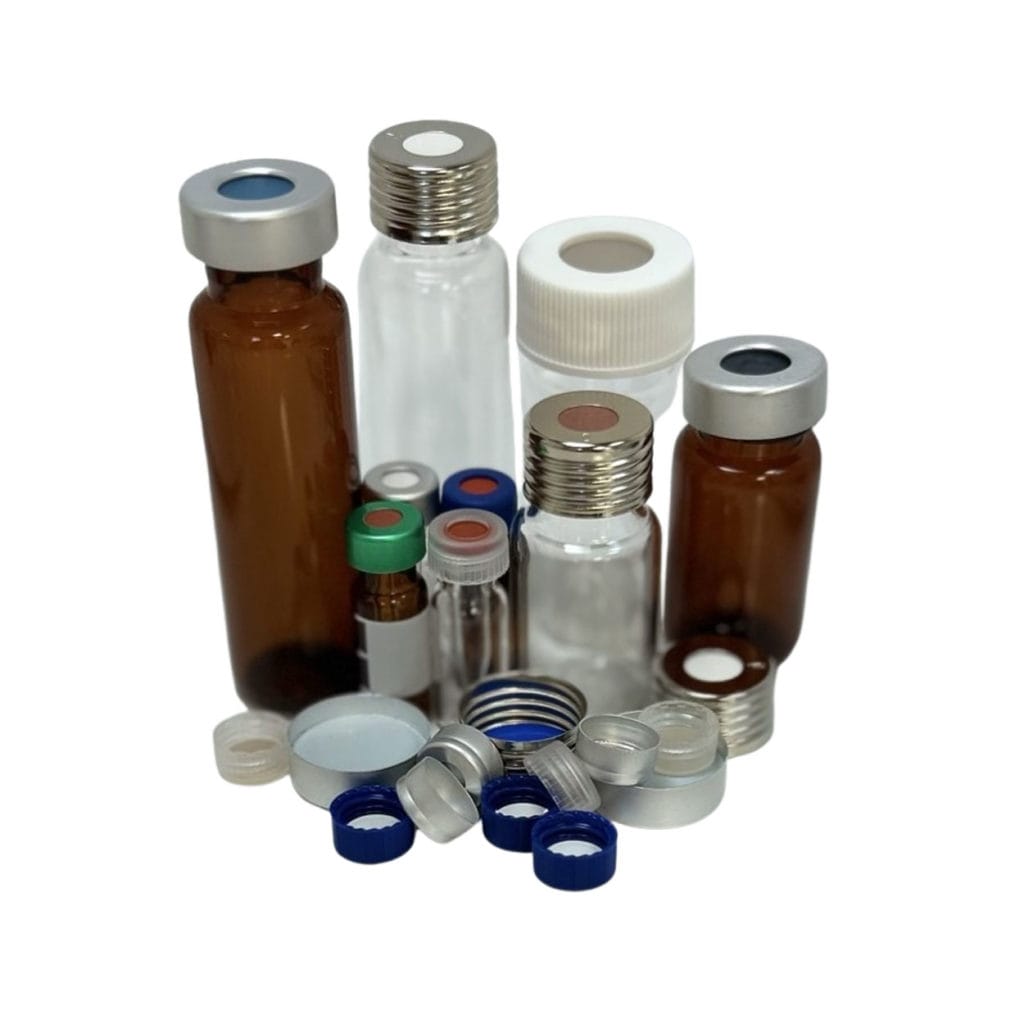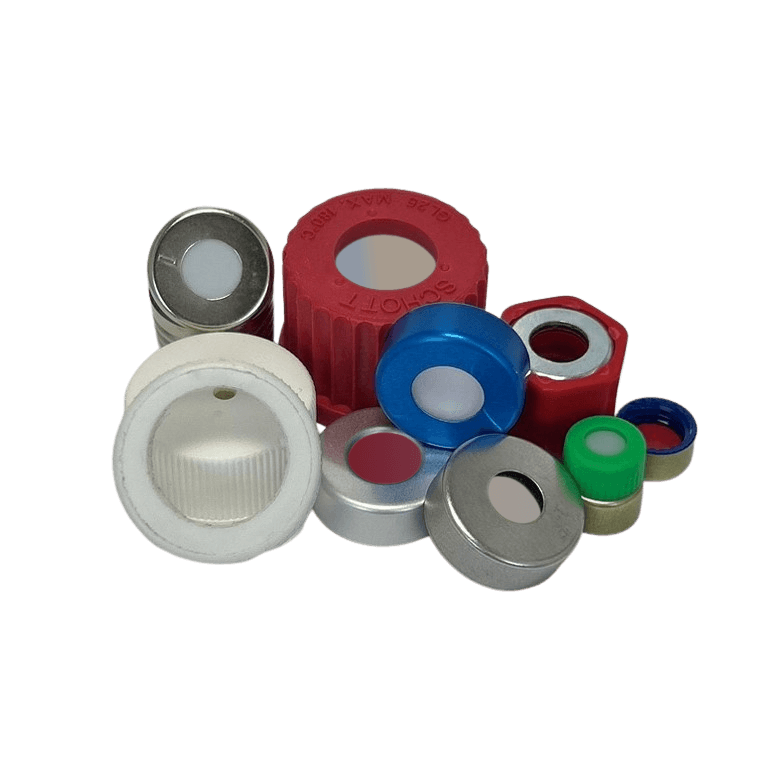DLLME with the Bilimex® range
Overview
DLLME (dispersive liquid-liquid microextraction) is an effective method for the concentration of liquids in chemical analysis.
This method is fast, efficient and requires only small amounts of solvents. In DLLME, immiscible solvent and miscible solvent are added to an aqueous sample to separate the analyte from interfering substances. LABC-Labortechnik offers sample vessels for manual and automated DLLME with different density gradients.
DLLME is more universal than SPME and less laborious than solid phase extraction, with low solvent consumption, easy concentration, and high recovery and reproducibility. These products are available in the bilimex® range.
Effective and automatable method for the concentration of liquid substance mixtures
In chemical analysis, dispersive liquid-liquid microextraction (DLLME) and its modifications are known as established sample preparation methods for the concentration of an analyte and the separation of interfering matrix DLLME can be carried out quickly and with low material requirements at high efficiency.
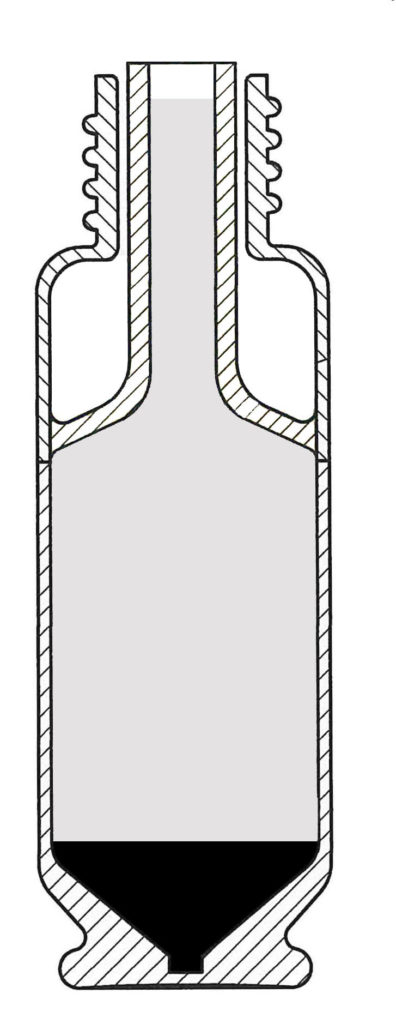
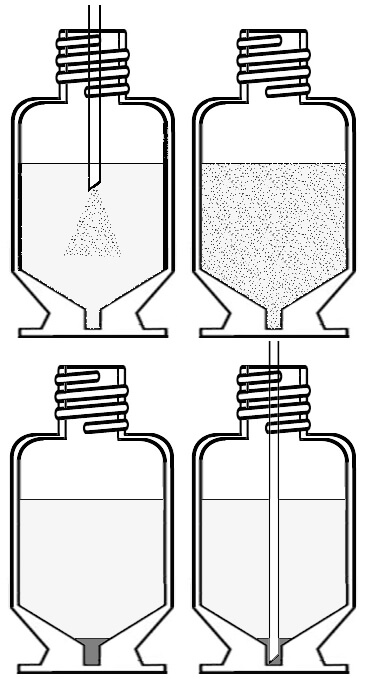
I In DLLME, small amounts of a water-immiscible solvent (extractant) and a water-miscible solvent (dispersant) are added to an aqueous sample. After mixing by emulsion formation, 2 phases are obtained by centrifugation. The organic phase (extraction agent) with the concentrated analyte freed from interfering matrix is removed via the cannula of a microlitre syringe and analysed. In DLLME, we distinguish between an extractant that has a lower density (LD) and an extractant with a higher density (HD) than water.
LABC-Labortechnik offers sample vessels for manual DLLME as well as for automated DLLME. In each case for samples with an extractant lighter (LD) and heavier (HD) than water.
The advantages of the DLLME sample preparation method:
- More universal than SPME
- less expensive than solid phase extraction
- Low solvent consumption
- simple concentration
- High recovery rate and reproducibility
The products are combined in the bilimex® range.
Basic structure of a DLLME with bilimex®
In the basic setup of the DLLME, an aqueous sample is mixed with a solvent that is immiscible with water (extractant) and a solvent that is miscible with water (dispersant). After mixing and emulsion formation, 2 phases are obtained by centrifugation. The organic phase (extractant) with the analyte concentrated and freed from interfering matrix is analyzed after extraction with a microliter syringe.
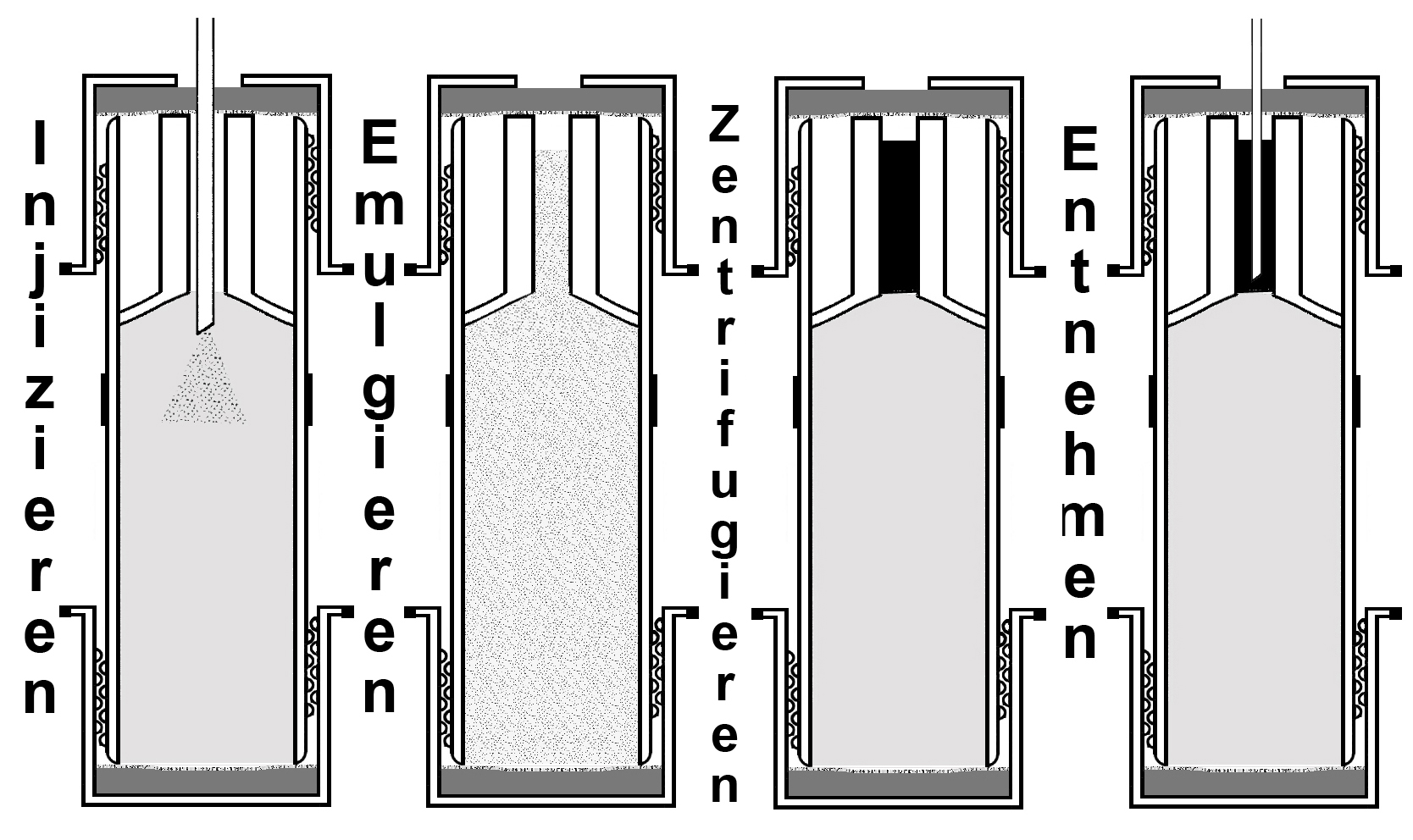
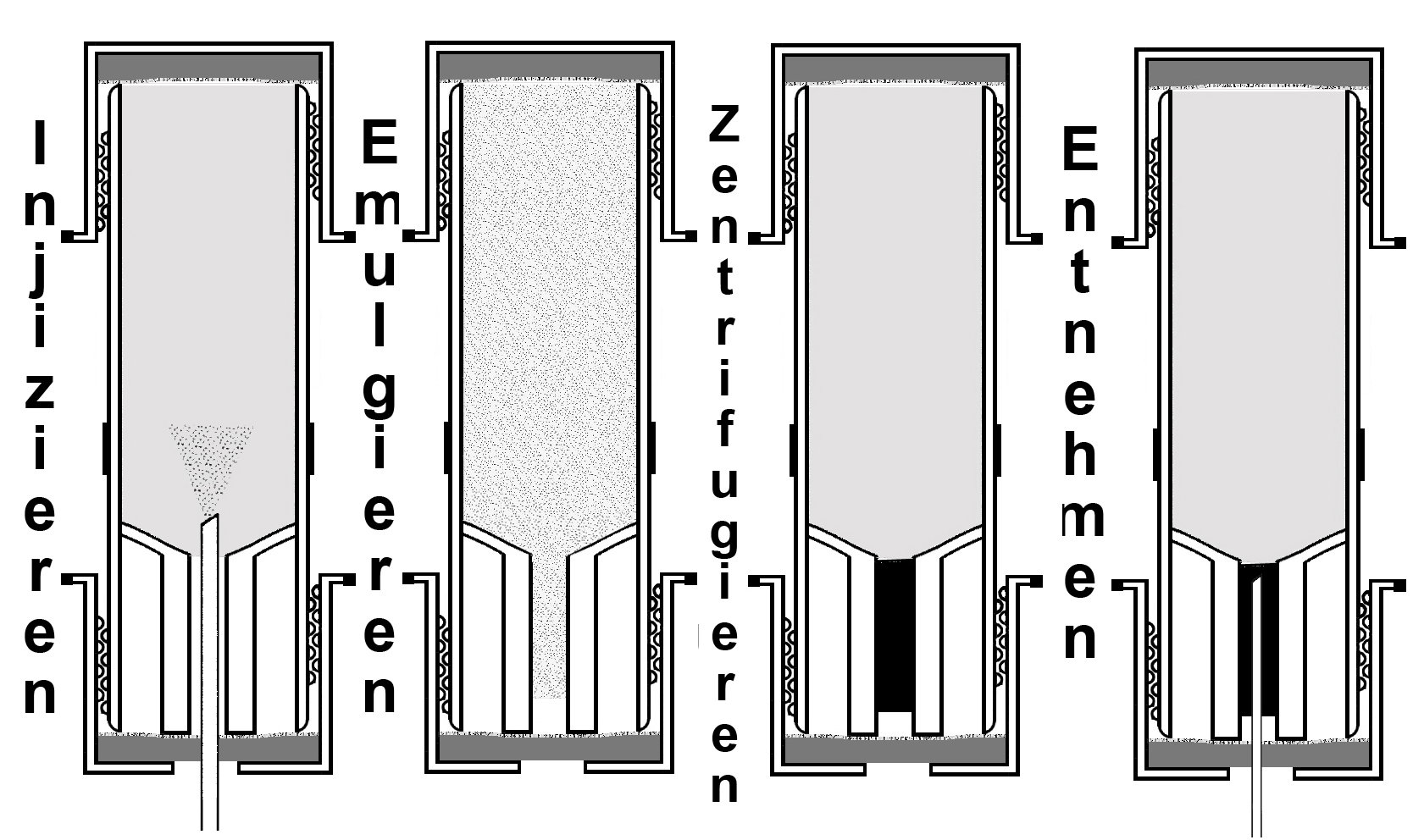
The DLLME process and the various Bilimex products can effectively concentrate and automate on your method.
bilimex® Description
What is dispersive liquid-liquid microextraction (DLLME) with the bilimex® range?
In the alternative sample preparation method Dispersive Liquid-Liquid-Microextraction (DLLME), the analyte of interest is extracted from aqueous solutions with a small amount of organic solvent, and concentrated at the same time.
Dispersive liquid-liquid microextraction (DLLME) is fast, automated, can be performed with low material consumption and high efficiency. In this method, analyte separation is performed by extracting aqueous samples with 10 μl to about 300 μl of a water-immiscible organic solvent (extractant), which has a higher or lower density than water, and a water-miscible solvent (dispersant). Halogenated hydrocarbons or ionic liquids are used as organic solvents (with higher density). In the case of the miscible solvent, these are acetone or methanol, for example. Hydrocarbons are used as organic solvents (with low density) and acetone or ethanol, for example, as miscible solvents.
The DLLME method achieves high recoveries and enrichment factors.
After addition of the extraction and dispersion agents, a dispersion is formed either spontaneously or after brief shaking – possibly also with ultrasonic irradiation – in which the nonpolar analytes dissolve abruptly into the finely dispersed organic extraction agent droplets. The formation of the emulsion increases the surface area of the non-polar phase and an equilibrium is established instantaneously. In the final centrifugation step, the dispersed droplets with the enriched analytes are centrifuged off and the analytes freed from the interfering matrix are collected and analyzed by sampling with a microliter syringe.
For the requirement of LD- and HD-DLLME LABC-Labortechnik developed four products of the bilimex® range.
The bilimex®-HD-MAN and the bilimex®-LD/HD-MAN were developed for manual DLLME. In LD-DLLME, the organic phase (extractant), which is lighter than water (LD, low density), precipitates at the top of the capillary. In HD-DLLME, a 180° rotation of the bilimex® causes the organic phase (extractant), which is heavier than water (HD, high density), to separate at the bottom of the capillary. By piercing the septum with the needle of a microliter syringe, the separated organic phase (extractant) can be removed and analyzed in each case.
The bilimex®-HD-AS, bilimex®-LD/HD-AS and Bilimex®LD PTFE165/Glass were developed for DLLME in the autosampler.
The bilimex®-HD-AS extractor made of glass in vial form with magnetic cap enables automatic injection and withdrawal via microliter syringe and autosampler. Its conical bottom is suitable for the DLLME-HD. It is used as a disposable item.
The bilimex®-LD/HD-AS extractor made of glass in vial form with magnetic cap enables automatic injection and withdrawal via microlitre syringe and autosampler. Its conical bottom and the fused funnel on top are suitable for DLLME-HD and LD. It can be used and cleaned several times.
Bilimex®LD PTFE165/Glass is for extractor made of glass in vial form with magnetic cap enables automatic injection and withdrawal via microlitre syringe and autosampler. The PTFE insert in the standard vial for the DLLME-LD. it is used as a disposable and is compatible with all ND18 caps.
bilimex®-MAN
| Article no. | Volume | Outer Ø | Height | GL thread |
|---|---|---|---|---|
| 120-0644198 | 9ml | 16 mm | 100 mm | GL14 |
| 120-0644211 | 9ml | 16 mm | 100 mm | GL18 |
| 120-0591805 | 23ml | 24 mm | 100 mm | GL25 |
| 120-0644228 | 37ml | 28 mm | 100 mm | GL25 |
| 120-0644242 | 45ml | 34 mm | 100 mm | GL25 |
| 120-0019507 | 75ml | 44 mm | 100 mm | GL32 |
| 120-0644259 | 75ml | 40 mm | 115 mm | GL32 |
| 120-0644266 | 240ml | 56 mm | 147 mm | GL45 |
| Article No. | GL thread |
|---|---|
| 120-0019217 | GL 14 |
| 120-0159920 | GL 18 |
| 120-0190831 | GL 25 |
| 120-0190671 | GL 32 |
| 120-0019231 | GL 45 |
bilimex®LD/HD-MAN
bilimex®LD/HD-MAN is a liquid-liquid microextractor for the sample preparation method DLLME (dispersive liquid-liquid microextraction) with an extraction agent that is lighter (LD =low density) or heavier (HD = high density) than water. bilimex®-LD/HD-Manual is an extractor for manual injection and withdrawal via microliter syringe. bilimex®-LD/HD-MAN can be cleaned and used several times.
bilimex®LD/HD-MAN
- Borosilicate 3.3 centrifuge tubes
- melted-in capilary and glass thread on both sides (GL 25)
- with PTB-red and PTFE-coated screw cap
- 3mm- silicone gaskets
Optional: silanized version (IS-2 inerting)
| Article no. | Sample volume | Capillary volume | Total length |
|---|---|---|---|
| 280-0396615 | 17 ml | 35 μl | 100 mm |
| 280-0396592 | 17 ml | 100 μl | 100 mm |
| 280-0400701 | 12 ml | 35 μl | 80 mm |
| 280-0400725 | 12 ml | 100 μl | 80 mm |
| 280-0400695 | 7 ml | 35 μl | 60 mm |
| 280-0400718 | 7 ml | 100 μl | 60 mm |
Optional septa to GL – screw cap GL 25
| Item.no | Material | GL thread |
|---|---|---|
| 120-0400626 | Butyl rubber red / PTFE grey, 2,4mm thick, 55 shore A | GL 25 |
If a silicone seal is not practical for an analysis, a sealing washer made of BK/PTFE could be an alternative. We are happy to manufacture other sizes and alternative septa materials for GL screw caps on request.
bilimex®HD-AS
bilimex®HD-AS is a liquid-liquid microextractor for the sample preparation method DLLME (dispersive liquid-liquid microextraction) with an extractant that is heavier (HD = high density) than water. bilimex®-HD-AS is an extractor for automated injection and withdrawal via microliter syringe.
In the outlined DLLME, an aqueous sample is mixed with a water-immiscible extractant and a water-miscible dispersant. After mixing and emulsion formation, 2 phases are separated by centrifugation. The extraction medium – HD – with the concentrated analyte freed from interfering matrix is located in the conical stand. It is taken through a microliter syringe and indexed into the analyzer. The extraction medium can be easily removed by using a conical bilimex tube. Bilimex®HD-AS can be used in swing-out rotors up to 3500 rpm. and designed for DLLME with extraction agents in high desity (HD).
The advantages of bilimex®HD-AS for the automation of DLLME-HD
- bilimex®HD-AS with a high-quality PTFE-coated silicone septum and a magnetic hole screw cap for automated operation by autosamplers.
- bilimex®HD-AS with an optimized residual drainage through a cylindrical instead of a conical design in the interior of the vial is the ideal separatory funnel in DLLME-HD for extraction agents that have a higher density (high density) than water.
- bilimex®HD-AS with stand for convenient handling during sample preparation with the DLLME-HD method. bilimex®HD can be used in centrifuges with swing-out rotors up to 3500 rpm.
bilimex®HD-AS
- made of brown / clear glass of the first hydrolytic class
- 23 x 72mm
- bottom conical with base
- magnetic headspace hole screw cap green
- Silicone/white PTFE Septum
- Loadable up to 150°C
- CTC autosampler suitable
- Centrifugable up to 1800g
Optional: silanized version (IS-2 inerting)
| Article no. | Sample volume | Glass color | IS-2 Inerting | Dimensions |
|---|---|---|---|---|
| 280-0397322 | 8 ml | Clear glass | no | 42 x 23 mm |
| 280-0400930 | 8 ml | Clear glass | yes | 42 x 23 mm |
| 280-0397414 | 8 ml | Amber glass | no | 42 x 23 mm |
| 280-0400602 | 8 ml | Amber glass | yes | 42 x 23 mm |
| 280-0401968 | 17 ml | Clear glass | no | 72 x 23 mm |
| 280-0404877 | 17 ml | Clear glass | yes | 72 x 23 mm |
| 280-0404907 | 17 ml | Amber glass | no | 72 x 23 mm |
| 2800404921 | 17 ml | Amber glass | yes | 72 x 23 mm |
IS-2 inerting is a new deactivation process. It ensures maximum inertness of the glass surface and prevents adsorption even of sensitive substances such as pesticides, amines, steroids and phenols.
Centrifugability according to EN 10204 is tested per batch. The test is performed with 1800g in a fixed-angle rotor at room temperature and a mixture of substances with the density of max. 1.2 g/ml. The batch certificate is supplied.
bilimex®-LD/HD-AS
bilimex®-LD/HD-AS is a liquid-liquid microextractor for the sample preparation method DLLME (dispersive liquid-liquid microextraction). The extractant can be heavier (high desity HD) and lighter (low density LD) than water. Bilimex®-LD/HD-AS is an extractor for automated injection and withdrawal via microliter syringe.
In the DLLME outlined on the left, an aqueous sample is mixed with a water-immiscible extractant and a water-miscible dispersant. The extractant is low density LD.
After mixing and emulsion formation, the two phases are separated by centrifugation. The extraction medium – LD – with the concentrated analyte freed from interfering matrix is located in the inner funnel. It is taken through a microliter syringe and injected into the analyzer. With bilimex®LD/HD-AS, a DLLME with LD or HD extraction agent is possible. For this purpose, see the flow charts above.
The extraction agent can be easily removed by using bilimex® vials with internal funnels. Bilimex®LD/HD-AS can be used in centrifuges up to 1800g. and designed for DLLME with extraction agents in low density (LD) or high density (HD). Centrifugability is documented with a batch test certificate. The vial can be loaded at least up to 1800g filled with a liquid with 1.2g/ml density.
The vial is manufactured in Germany in a complex manufacturing process. The bilimex®-LD/HD-AS vials are cleaned in a laboratory dishwasher or (automatically, e.g. with an MHE tool for CTC autosamplers. For the removal of the solvents, a liquid microliter syringe is used instead of a headspace microliter syringe. Replacement septa are also available as accessories made of other materials.
Advantage of DLLME LD in bilimex®LD/HD-AS: Low density (LD) solvents suitable as extraction agents are more environmentally friendly.
Application examples: For a LD-DLLME, 11.2ml of aqueous solution is provided and 300ƒÊl of solvent mixture is injected.
Example 1
With a complete extraction, this corresponds to an enrichment by a factor of 37.3. Using a microliter syringe, approximately 250ƒÊl above the phase boundary can be sampled for analysis.
Example 2
For an HD-DLLME, 11.5 ml of aqueous solution is prepared and 30ƒÊl of solvent mixture is injected For a complete extraction, this corresponds to an enrichment by a factor of 383. Using a microliter syringe, approximately 25ƒÊl below the phase boundary can be sampled for analysis.
bilimex®LD/HD-AS
- made of brown / clear glass of the first hydrolytic class
- 23 x 72mm
- top and bottom conical with base
- magnetic headspace hole screw cap green
- Silicone/white PTFE Septum
- Loadable up to 150°C
- Centrifugable up to 1800g
- CTC autosampler suitable
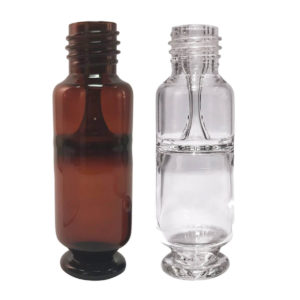
Optional: silanized version (IS-2 inerting)
| Article no. | Sample volume | Glass color | Dimensions |
|---|---|---|---|
| 120-0934206 | 10 ml | Clear glass | 72×23 mm |
| 120-0750035 | 10 ml | Amber glass | 72×23 mm |
Closure:
Screw cap with magnetic screw cap, blue, with GHS thread and inserted 3 mm silicone/white PTFE septum suitable for CTC autosampler. The closure can withstand temperatures of up to 150°C.
VPE= 100 Stk.
Item number: 120-0750059
PTFE-laminated septa made of alternative elastomers and alternative cap colors on request!
bilimex®LD PTFE165/glass
bilimex®LD PTFE165/Glass is a liquid-liquid microextractor for the sample preparation method DLLME (dispersive liquid-liquid microextraction). The extractant is lighter (low density LD) than water. bilimex®-LD PTFE165/Glass is an extractor for automated injection and withdrawal via microliter syringe in routine analysis.
bilimex®LD PTFE165/glass is inexpensive to produce and also allows DLLME with a solvent lighter than water. It is particularly suitable for routine applications with very high throughput, where cleaning of the bilimex® extractors is not desired.
The vial closure is magnetic and fits standard autosampler systems.
Bilimex®LD PTFE165/Glass consist of ND18 fine thread vials with rounded bottom and 1st hydrolytic class glass, and a PTFE insert with a capillary volume of 165 µl. Bilimex®LD is suitable for use in centrifuges up to 1800g. A factory certificate according to EN 10204 is provided for each batch
PU = 10 pieces
| Volume | Dimensions | Glass type | Item no. |
|---|---|---|---|
| 10ml | 46 x 22,5mm | Clear glass | 120-0933513 |
| 10ml | 46 x 22,5mm | Amber glass | 120-0933544 |
| 20ml | 75,5 x 22,5mm | Clear glass | 120-0933537 |
| 20ml | 75,5 x 22,5mm | Amber glass | 120-0933551 |
Magnetic screw caps ND18 for Bilimex®LD PTFE165/glass can be found in our brochure 152 or on www.LABC.de.
Bilimex® Examples
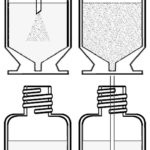 The DLLME with the bilimex® range is flexibly applicable to many methods of concentration. Two simple examples of use with bilimex®:
The DLLME with the bilimex® range is flexibly applicable to many methods of concentration. Two simple examples of use with bilimex®:
For an LD-DLLME, 11.2 ml of aqueous solution is prepared and 300 µl of solvent mixture is injected.
Example 1
With a complete extraction, this corresponds to an enrichment by a factor of 37.3. With a microliter syringe, approx. 250 ?l above the phase boundary can be extracted for analysis.
Example 2
For an HD-DLLME, 11.5 ml of aqueous solution is prepared and 30 ?l of solvent mixture is injected. For a complete extraction, this corresponds to an enrichment by a factor of 383. With a microliter syringe, approx. 25 µl can be removed below the phase boundary for analysis.
In addition, Dr. M.A. Althoff from the Science Division, CBRN Defence, Safety and Environmental Protection School from Sonthofen, Germany designed a poster on DLLME with bilimex®.
On the subject of styrene oligomers from food contact materials and articles, detection and determination of styrene oligomers in food and simulants, you will find a detailed report in the Deutsche Lebensmittelrundschau.
Bilimex® Product Catalog
We have summarized the entire range of products for DLLME with the Bilimex® range in the brochure. In addition, you will find technical articles and other publications on this page.
This PDF summarizes the bilimex® product range clearly and with all article numbers.
Technical article Analytica 2018
German technical article by Werner Zillger on the subject of DLLME with bilimex®.
SAMPLE PREPARATION STEPS BY AUTOMATION
English poster “MULTIPLE SAMPLE PREPARATION STEPS MADE EASY BY AUTOMATION” by M.A. Althoff (Science Division, CBRN Defence, Safety and Environmental Protection School, Sonthofen, Germany).
“Styrene oligomers from food commodities.”
Publication “Styrene oligomers from food commodities detection and determination of styrene oligomers in food and simulants” by T. Funke*, C. Goldbeck, T. Püth, S. Kunenim DLR (Deutsche Lebensmittelrundschau) 2018.
